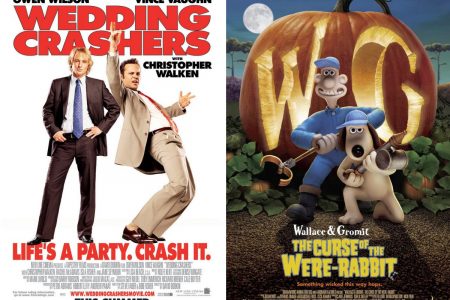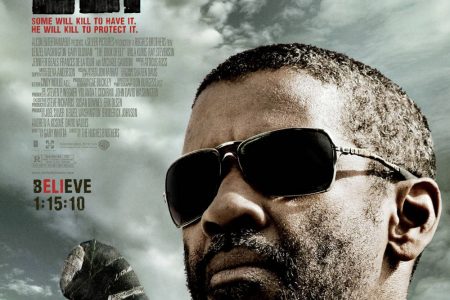There are many aspects of the Harry Potter films that have got darker as they have progressed, to be expected from a series about the rise of a dark wizard who killed the hero’s parents, with the last film including the onscreen death of an albeit minor character. And this doesn’t even mention the darkness of Daniel Radcliffe’e eyebrows. But the fifth film has the darkest yet – the sight of Dudley Dursley as a hoodie in training. Scary.
The film opens with Harry and Dudders being attacked by two Dementors in Little Whinging; Harry uses a Patronus charm to repel them, only to receive a letter from the Ministry of Magic telling him that he has been expelled from Hogwarts and has to attend a hearing at the Ministry about it. Before that happens, he is taken to a secret house belonging to Sirius Black by other members of the Order of the Phoenix (Moody, Lupin, and new characters Kingsley Shacklebolt and Tonks). There, talk is of the return of Voldermort and keeping Harry safe; he wants to fight, something that makes Sirius happy but nobody else.
Arthur Weasley takes Harry to the hearing (the set design for the Ministry of Magic is quite spectacular), which has been abruptly moved up the schedule. Even though it looks like Fudge is trying to railroad Harry, Dumbledore turns up to save the day, even though he refuses to talk to Harry afterwards. Harry returns to school, but is greeted by cold shoulders of school mates who believe the Ministry-enforced line of the Daily Prophet, which suggests that Harry is lying and Dumbledore is an idiot for believing him.
Life at school isn’t helped by the introduction of a new Defence Against the Dark Arts teacher, the Under Secretary of the Ministry, Dolores Umbridge (Imelda Staunton in wonderful form as the pink-suited smiling evil woman who makes you glad you are not at school anymore). When they are told that their Defence classes will be theoretical from now on, Hermione persuades the only person with practical experience to teach them how to fight: Harry.
Although lacking confidence, Harry turns out to be a good teacher, and the relationship with Cho Chang blossoms, while their group (Dumbledore’s Army) avoids Umbridge (now Inquisitor) and her Slytherin-packed group of schoolchildren enforcers, until the DA is betrayed. This leads to Dumbledore being accused of leading this rebellion – he assumes the guilt but escapes Hogwarts, leaving Umbridge to become Headmistress. Thanks to some quick thinking from both Hermione and Ron, they escape in order to act on the visions Harry has been receiving from Voldemort’s brain, leading to the fight for what Voldemort has been seeking and what the Order of the Phoenix has been protecting …
The fifth film in the Harry Potter series is definitely as good as the last two have been. However, it seems that they took the ‘darkest yet’ theme too far in the visual aspect of the movie. The film itself is very dark in colour – the bright lights seem to have avoided the entirety of the movie, with the dark sets of the Ministry and the school only occasionally being alleviated by the lightness of the scenes in the Room of Requirement. Matching this with the absence of much of the character-based humour of the previous instalments (and the books) makes for a tonal change that doesn’t fully grasp the full nature of the books. Yes, the books are getting more serious, but that doesn’t make them po-faced plot machines.
The darkness of the visuals doesn’t help with the director’s handling of the action and the magic of the films. The climactic showdown at the end is muddied by the dark visual palette, which, as well as condensing the action, doesn’t allow it to punch its way out of the ‘serious’ constrictions of the film itself. There is some hint of the magic (members of the DA producing their patronuses) but the flourishes are few and far between. Yates doesn’t appear to be a visually gifted director, which is a shame for a movie that cries out for it (see my adoration of the Alfonso Cuaron-directed third film).
Where Yates succeeds admirably (along with the well-written and slimmed-down script by new-to-the-series Michael Goldenberg) is in the character moments – the actors are allowed to shine in their interaction with each other, making the film come alive. The adults involved, most with very little to do in this film, all wring as much out of their moments as possible (Staunton having the most fun with her large screen time, but Rickman shining as Snape as always); particularly affecting is the interplay between Radcliffe and Oldman, who make the Harry–Sirius relationship completely believable. Oldman has a lot of fun with his rogueish character, particularly the skilful yet dazzling use of a wand in the final showdown.
As with the last film, the book had to be chopped down considerably to become a film (even at over two hours, it crams everything in to a fast running time), meaning that a lot is left out for fans of the book and Emma Watson and Rupert Grint have little to do as Hermione and Ron. Admittedly, this is Harry’s story (as they all are) and film prefers the arc of a single protagonist, but these three are very much the heart of the series. Another factor, as mentioned in my run-up to this review, is that the specifics that are left out indicate aspects which are not important for the final book – there is no discussion about the similarity between Harry and Neville in the prediction that occurs in the book, suggesting that it was a red herring.
Taken as a film in its own right, the fifth film is still and enjoyable and exciting spectacle; the actors are fully immersed in their roles, the sense of doom (both from the Death Eaters and the Ministry, with its allusion to 1984) is palpable, the world in which they habit feels real and believable and the pace of the story leaves you breathless and eager for more. It’s not perfect, and I have my doubts about Yates as the helmer for the next film, but I want to watch it again, which shows you he must have done something right. Now, the only question remains is why the Ministry has a room full of crystal balls on thousands of very high shelves but seemingly no magical protection in case one of the shelves gets accidentally knocked over …
Rating: DAVE





I agree with you and to add my penny worth:
The film, for me, lost too much of the magical, creative world conjured up in the previous films, particularly Prisoner of A. The director for Order of the P chose to sacrifice the magic to add an element of dark realism to the film – forcing it to ‘grow-up’.
Is realism what we really want from these films? Is realism why everyone went Potter crazy? I think not.
There are more imaginative ways to create a dark tone and I hope to goodness they realise this for the next film.